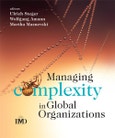Drawing together insights from across the expert faculty, Managing Complexity in the Global Organization presents IMD’s framework on how to understand complexity and its four key drivers (diversity; interdependence; ambiguity and flux), along with solutions on specific issues in a variety of functions, industries and markets. The focus is on providing practical solutions based on real-life examples.
Table of Contents
Contributors.Foreword by the Editors.
Acknowledgements.
Part I Conceptual Framework and Trends on the Macro-level.
Chapter 1 Managing Complexity in Global Organizations as the Meta-challenge (Martha Maznevski, Ulrich Steger, and Wolfgang Amann).
Chapter 2 The Complexity of Managing Corporate Social Responsibility in Multinationals (Michael Yaziji and Karin Oppegaard).
Chapter 3 Opportunities and Threats in the Global Political and Economic Environment (Jean-Pierre Lehmann).
Part II Impact of Changes in the Competitive Landscape and Business Models on Complexity in Selected Industries.
Chapter 4 The Need to Look at Complexity at the Industry Level (Ulrich Steger and Wolfgang Amann).
Chapter 5 Shipping Organizations – The Ultimate Global Players (Peter Lorange).
Chapter 6 Managing Complexity Caused by Industry Dilemmas: The Case of the Automotive Industry (Ulrich Steger).
Chapter 7 Managing Complexity with an Electronic Manufacturing Services Supplier (Wolfgang Amann, Carlos Cordon, Ralf W. Seifert, and Thomas E. Vollmann).
Chapter 8 Managing Complexity in the Financial Services Industry (Arturo Bris).
Part III Solutions for Managing Complexity on the Functional Level.
Chapter 9 Breaking Down Complexity Management to the Functional Level (Wolfgang Amann and Ulrich Steger).
Chapter 10 Complexity in Global Business Strategies: The Cumulative Impact of the Crisis of Choices (Jean-Pierre Jeannet).
Chapter 11 Various Dimensions of Complexity in Effectively Managing the Innovation Process – The Role of China (Georges Haour).
Chapter 12 Managing Complexity with Management Diversity (Martha Maznevski and Karsten Jonsen).
Chapter 13 The Role of Information in Creating Value Efficiently (Don Marchand and Amy Hykes).
Chapter 14 Dealing with Complexity by Managing Knowledge-Based Competence of the Organization (Kazuo Ichijo).
Chapter 15 Managing Complexity in Marketing and Supply Chains (Ralf W. Seifert and Wolfgang Amann).
Part IV Additional Complexity Challenges.
Chapter 16 The Price Tag of Ignoring Complexity in the Globalization Process (Wolfgang Amann).
Chapter 17 Managing Complexity in Mergers and Alliances (Ulrich Steger).
Chapter 18 Managing Complexity: The Family Business Experience (John Ward).
Chapter 19 The Future of Managing Complexity (Wolfgang Amann, Ulrich Steger, and Martha Maznevski).
Index.








